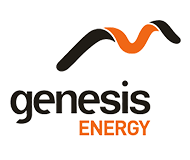Genesis Energy
Accueil » Ressources » Études de cas » Genesis Energy

Business Objective
To improve customer service, better recover costs from customers and to financially plan with more certainty.
Business Benefits
All users can now quickly and easily see where work orders are in the system – leading to major improvements in customer service. Work orders are no longer lost, customers are billed for the correct services and the performance of contractors can be monitored.
Genesis Energy improves customer service with a workflow management solution
As organisations outsource non-core functions and get third-parties to service their clients, the need for systems to orchestrate these business processes becomes critical to maintaining service standards. New Zealand’s largest energy retailer was not immune to problems with coordinating dozens of third parties until it commissioned an online workflow management system from B2BE…
With more than 690,000 customers and 57 service providers throughout New Zealand on top of an outsourced call centre, a lot of to-ing and fro-ing was required to make sure Genesis Energy work orders – including meter reads and service requests – were completed properly.
About Genesis Energy
Genesis Energy is one of the big three state-owned energy companies created when the Electricity Corporation of NZ was split up in 1999. Genesis Energy is a major electricity generator operating a diverse portfolio of generation assets including thermal, hydro, wind and co-generation. As a retailer Genesis Energy has more than 690,000 electricity and gas customers, located mainly in the North Island. This makes it the largest energy retailer in New Zealand.
Visit www.genesisenergy.co.nz
Previously Genesis Energy had been using its customer database to manage jobs. But as this database was only partially automated and was inaccessible to third-parties, human error often meant work orders could go to the wrong place, jobs could be poorly recorded or work wasn’t charged for.
“We have a good billing engine but we did not have a suitable workflow management tool.” says Genesis Energy service delivery manager Peter McComish.

McComish is refreshingly frank about the challenges facing the company and how it successfully overcame them.
As he explains, work orders could be sent to the wrong contractors. “We’ve got five different contractors in Hamilton alone and the customer services person in the front office didn’t know who was doing what.”
“They (the contractors) would quite often ring and say we had sent the wrong work order. Other times the work orders would get lost and nothing would happen. We had examples of contractors who had received the same work order a number of times.” “This resulted in customer requests that were not actioned and lots of work in the system that did not get closed off.”
And because Genesis Energy couldn’t be sure where the communication breakdowns were occurring, contractors could not be held accountable for the work they were doing.
“We needed visibility of work going out to contractors,” says McComish. “We needed to be able to report on it and we needed to give the people who use that information visibility of that information.”
Wanting to fully automate its processes and get accountability from all parties Genesis Energy turned to B2BE (then called The ECN Group in New Zealand) for a workflow management solution.
Based on B2BE’s Business Process Management solutions, the Field Service System (FSS) was developed. Essentially, B2BE’s FSS orients the IT systems of the various stakeholders around a business process.


Internal facing and complex ERP systems can be opened up to all stakeholders in a process – even if they work for another company – and processes can be presented in a user friendly and intuitive way specific to the users’ needs. Interacting with Genesis Energy’s customer, asset and mapping databases, FSS is now used for all work orders except general faults – including new connections, disconnections and reconnections, upgrades and downgrades (for businesses) and maintenance on metering equipment.
Instead of the call centre, the contractors and Genesis Energy staff all using different systems and communicating with each other via phone, fax or email, they are all now working off the same system. Some are integrating their own systems with FSS via a BizTalk layer that B2BE also deployed, whilst others access the system via the web or mobile devices.
“If it’s not done in FSS it’s not done,”
Peter McComish, Genesis Energy Service Delivery Manager
FSS has totally changed the way work orders are processed, with Genesis Energy’s general manager retail Vince Hawksworth likening its implementation to the implant of a vital organ into the company.
Rather than receiving spreadsheets with active work orders on them, Genesis Energy’s 57 service providers – who range from large multi-national corporations to one-man-bands – now have access to FSS over the web or their mobile devices.
Enfin, les fonctions de la solution sont en mesure d'alimenter directement l'environnement EDI de B2BE pour l'enrichissement des données, la traduction et la conversion dans le format requis par le système de Rexel. Sur cette base, B2BE crée une configuration de capture des bons de commandes des clients de Rexel « générique » qui extrait ensuite les données en fonction des informations requises par Rexel. Lorsque le résultat ne peut pas être extrait à l'aide de la configuration de capture de l’approche générique , une configuration de capture personnalisée est créée pour répondre aux besoins spécifiques de certains clients. Cette approche est généralement requise lorsque les informations sur la ligne de commande d'un client sont plus complexes, par exemple lorsque les numéros d'article et les descriptions sont regroupés dans un seul bloc d'informations. Le personnel de Rexel peut ajouter des variables de métadonnées aux programmes de conversion afin que le logiciel puisse reconnaître des informations plus complexes.
Genesis Energy’s back office staff and its call centre can now see where all work orders are in the system, what’s been closed off and what hasn’t. The potential for human error has been greatly reduced, leading to major improvements in customer service. “If it’s not done in FSS it’s not done,” says McComish. “There’s no to-ing and fro-ing with contractors saying I did or didn’t do that job.” Says Genesis Energy’s team manager billing Natasha Dauphin: “It’s all about real-time and being able to see the work orders and the stage those contractors are at with those jobs so we can make an informed judgment of where our next job will be. It gives us a whole lot of visibility about what contractors are up to.”
Auto charging functionality in FSS means that when the company charges customers for certain services, Genesis Energy can reconcile these charges with Invoices from Service Providers.
Contractors also benefit by getting access to a lot more information relating to the number and location of all meters at a property, as well as things like dog warning notes.
The next stage of the project will see more reporting functionality being added to FSS so Genesis Energy can generate status reports – how many work orders have flowed through in a month – and snapshot reports – looking at all active jobs in the system. “While the information is available in real time at our fingertips, more analysis is required to assist with planning,” says McComish. The B2BE solution also gives Genesis Energy the ability to actively monitor service level agreements on its contractors. “Everyone says that contractors don’t do work on time,” says McComish. “Now, whether they do or they don’t, we can prove it. This will let us manage the contractors better and ultimately improve customer service.”
Genesis Energy is measuring the benefits of FSS and Hawksworth is convinced it will demonstrate its’ value. “FSS gives Genesis Energy control and visibility across the vital fields services function meaning we can do more for our customers at less cost,” he says.
